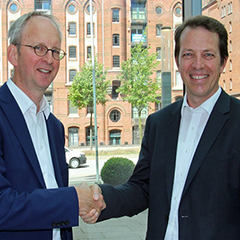· Leading German offshore conference to take place directly after the first round of German offshore tenders
· Keynote speakers include Michael Hannibal, CEO Offshore at Siemens Wind Power, Wilfried Breuer, CEO at TenneT Offshore and Gunnar Groebler Senior VP Wind at Vattenfall
Hamburg, Germany – 21st September 2016 – For the first time the world’s largest resource of independent energy experts DNV GL and the EEHH “Renewable Energy Hamburg” cluster are jointly organising the “Hamburg Offshore Wind” (HOW) conference. The event will take place on 5th April 2017 at the Hotel Hafen Hamburg. The event will start on the evening of 4th April 2017 with a political opening speech by a top-level representative and a networking dinner. The conference is expected to take place directly after the first round of German tenders at the end of March 2017, for new offshore wind parks that are to be built after 2020.
The conference will deal with how the role of offshore wind energy will develop in respect to future energy supply in Germany and Europe under the changing political conditions after 2020. Under the motto “Offshore Wind after 2020– tenders as a way to reduce costs?!”, leading executives and representatives of the offshore wind industry will get together to exchange views and insights on the future of the industry concerning future and existing tender models.
To date, the following speakers have confirmed their participation at the event:
· Michael Hannibal, CEO Offshore at Siemens Wind Power as a keynote speaker
· Wilfried Breuer, CEO at TenneT Offshore
· Gunnar Groebler Senior Vice President the Business Area Wind at Vattenfall
· Enak Ferlemann, Parliamentary State Secretary at the Federal Ministry of Transport and Digital Infrastructure (BMVi) in Germany
Due to the recently adopted amendment to the German Renewable Energy Sources Act (EEG), which will come into force in Germany on 1 July 2017, most renewable energy projects will be awarded via a central tendering process. Sceptics fear that the amendments to the law will result in a reduction in the number of offshore wind energy projects, which was limited to 500 megawatts in the years 2021 and 2022 according to the EEG amendment. Supporters see the tender process as an important step towards commercial viability.
Dr. Andreas Schröter, Executive Vice President at DNV GL – Energy: “The move towards a tender model will decisively change the German wind energy market and also influence the formation of international offshore markets. We are very pleased to join forces with EEHH as the leading network for renewable energy sources, to offer international players a platform for sharing experiences and knowledge within the framework of our conference.”
Jan Rispens, Managing Director of EEHH GmbH: “Offshore wind has achieved remarkable cost reductions this year internationally. We are convinced that the cost curve will continue to develop rapidly, and that offshore wind will make a very attractive contribution to the energy mix of the future with a very reliable energy yield. We are happy to enter into this cooperation agreement with DNV GL, which will enable us to further improve the technical and economic aspects of the HOW conference, which has now been running since 2002.
Michael Hannibal, CEO Offshore of Siemens Wind Power and responsible for the keynote, said, “In the last few decades our industry has demonstrated that we can significantly reduce the generation costs for offshore wind energy. Current market prices show that the industry has already met and exceeded its own goals for 2020. Through investments in new technologies, testing procedures and industrialisation, the manufacturers played a major part in this development. With innovations and ongoing development efforts we will continue to reduce electricity generation costs. Therefore it is necessary that the conditions needed for this development remain in place in the future as well. Only in this way the industry can provide society with sustainable, reliable, and affordable offshore wind power. I’m delighted that we are part of the high-level HOW Conference here in Hamburg, the most important German offshore wind energy city.”
The Hamburg Offshore Wind Conference is highly appreciated due to its outstanding technical and political content as well as the great networking opportunities. Over the past few years, between 150 to 200 international participants have visited the conference.
About DNV GL
Driven by its purpose of safeguarding life, property and the environment, DNV GL enables organisations to advance the safety and sustainability of their business. DNV GL provides classification and technical assurance along with software and independent expert advisory services to the maritime, oil & gas and energy industries. It also provides certification services to customers across a wide range of industries. DNV GL, whose origins go back to 1864, operates globally in more than 100 countries with its 16,000 professionals dedicated to helping their customers make the world safer, smarter and greener.
DNV GL in the Energy industry
In DNV GL we unite the strengths of DNV, KEMA, Garrad Hassan, and GL Renewables Certification. DNV GL’s 2,500 energy experts support customers around the globe in delivering a safe, reliable, efficient, and sustainable energy supply. We deliver world-renowned testing, certification and advisory services to the energy value chain including renewables and energy efficiency. Our expertise spans onshore and offshore wind power, solar, conventional generation, transmission and distribution, smart grids, and sustainable energy use, as well as energy markets and regulations. Our testing, certification and advisory services are delivered independent from each other. Learn more at www.dnvgl.com/energy
About Renewable Energy Hamburg
The EEHH “Renewable Energy Hamburg” cluster was set up in order to strengthen and promote cooperation in the sector. It works to pool the wide-ranging skills among companies, research facilities and institutions. It also provides a platform for dialogue among stakeholders, and promotes interfaces to other sectors, such as logistics.


























